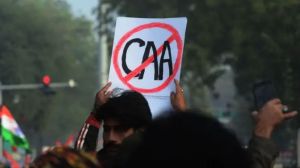Why is Cong in state of denial over Assam?
Not to recognise that illegal immigration from Bangladesh is the root cause of Assam’s problems is tantamount to intellectual hypocrisy and political arrogance. Congress leaders are guilty of both

When Prime Minister Manmohan Singh visited Assam after the United Liberation Front of Assam massacred 70 poor Bihari workers recently, he said, “Violence will not be tolerated.” But given his party’s dreadful track record of dealing with Assam’s agony since 1947, he might as well have added, “… but the root cause of violence will be.”
The root cause of Assam’s angst, which since 1979 has erupted violently in different forms, has been the steady influx of illegal immigrants from Bangladesh. Bhupen Hazarika, Assam’s greatest living cultural icon, expressed this anguish in a lyric he composed in 1968: “Today’s Assamese must save themselves or else they will become refugees in their own land.” The lyric almost prophesied the students’ anti-foreigner agitation in 1979, which ended with the signing of the famous Assam Accord in 1985. Sadly, that accord is today a worthless piece of paper because of the Centre’s refusal to repeal the IMDT Act, which gives legal protection to infiltrators.
Not to recognise this root cause is tantamount to intellectual insensitivity and political arrogance. Congress leaders are guilty of both. Neither Sonia Gandhi nor Singh have made a single pronouncement to show their serious concern over the issue, and have often eaten their own words under the threat of fundamentalist Muslim organisations that see no problem in what is a life-and-death problem for Assam. And they have communalised the demand for repeal of the IMDT Act, saying it is needed to protect the minorities.
Here is my poser to Congress leaders and to others who project themselves as guardians of secularism: “How would you react if someone were to advocate officially protected mega-scale migration of non-Kashmiris from other parts of India into the Kashmir Valley? Such advocacy would, of course, be wrong. But do you, who branded the anti-foreigner agitation in Assam as anti-national, have the courage and honesty to say that millions of foreigners settling in Assam is similarly wrong?”
Let me cite two instances of how Congress leaders betrayed Assam’s — and India’s — interests by genuflecting before considerations of vote-bank politics. On April 10, 1992, Assam’s then chief minister, Hiteswar Saikia, stated in the Legislative Assembly that there were “between two and three million” Bangladeshi infiltrators in Assam. This candid admission received an angry reaction from the Muslim Forum, headed by Abdul Muhib Mazumdar, a Congressman himself and a political rival of Saikia. He reminded the chief minister that the Congress party’s survival in power depended on ‘Muslim votes’ and warned that it would take “just five minutes for the Muslims of Assam to throw your government out.” Result: Saikia soon declared there was not a single illegal migrant in the state!
Now see the repeat performance — how Dr Manmohan Singh challenged information about Bangladeshi infiltrators presented by his own ministerial colleague. On July 15, 2004, Union Minister of State for Home Affairs Shreeprakash Jaiswal stated in Rajya Sabha that “1,20,53,950 illegal Bangladeshi migrants were residing in 17 states and Union territories as on 31 December, 2001.” He disclosed that 50 lakh Bangladeshis were residing in Assam. The prime minister happened to be in Guwahati the next day. There he faced a vociferous protest from Assam’s worried Congress Chief Minister Tarun Gogoi. The worry was: “What will happen to our party in the 2006 Assembly elections?” The politician in Manmohan Singh understood what the honest patriot in him must have certainly loathed. He publicly stated that he doubted the veracity of the statistics provided by Jaiswal. A week later, the worthy MoS told Parliament that the information provided by his own ministry about Bangladeshi infiltrators “is unreliable and based on hearsay.”
But this information fully tallies with the figures given by Assam Governor Ajai Singh and his predecessor S.K. Sinha. Singh stated in a 2005 report: “This (Indo-Bangladesh) border is one of the world’s most fluid borders, crossed daily by some 6,000 Bangladeshis who come in search of work, often staying to join the estimated 20 million illegal immigrants in the country”. How did the chief minister react to the governor’s report? Gogoi dismissed it as “totally baseless”!
When India’s rulers themselves lie for myopic reasons of self-preservation, why blame only India’s enemies for patronising Ulfa’s terrorist campaign, which is based on another lie — namely, that never in its history has Assam been a part of India? Ulfa’s anti-India tirade must be seen as a dangerous degeneration of Assam’s angst and helplessness.
Is there, then, a just, non-communal and workable solution to Assam’s problem, which is also consistent with the ideal of peaceful and good relations with Bangladesh? Read the third column in this series next week.



- 01
- 02
- 03
- 04
- 05




























